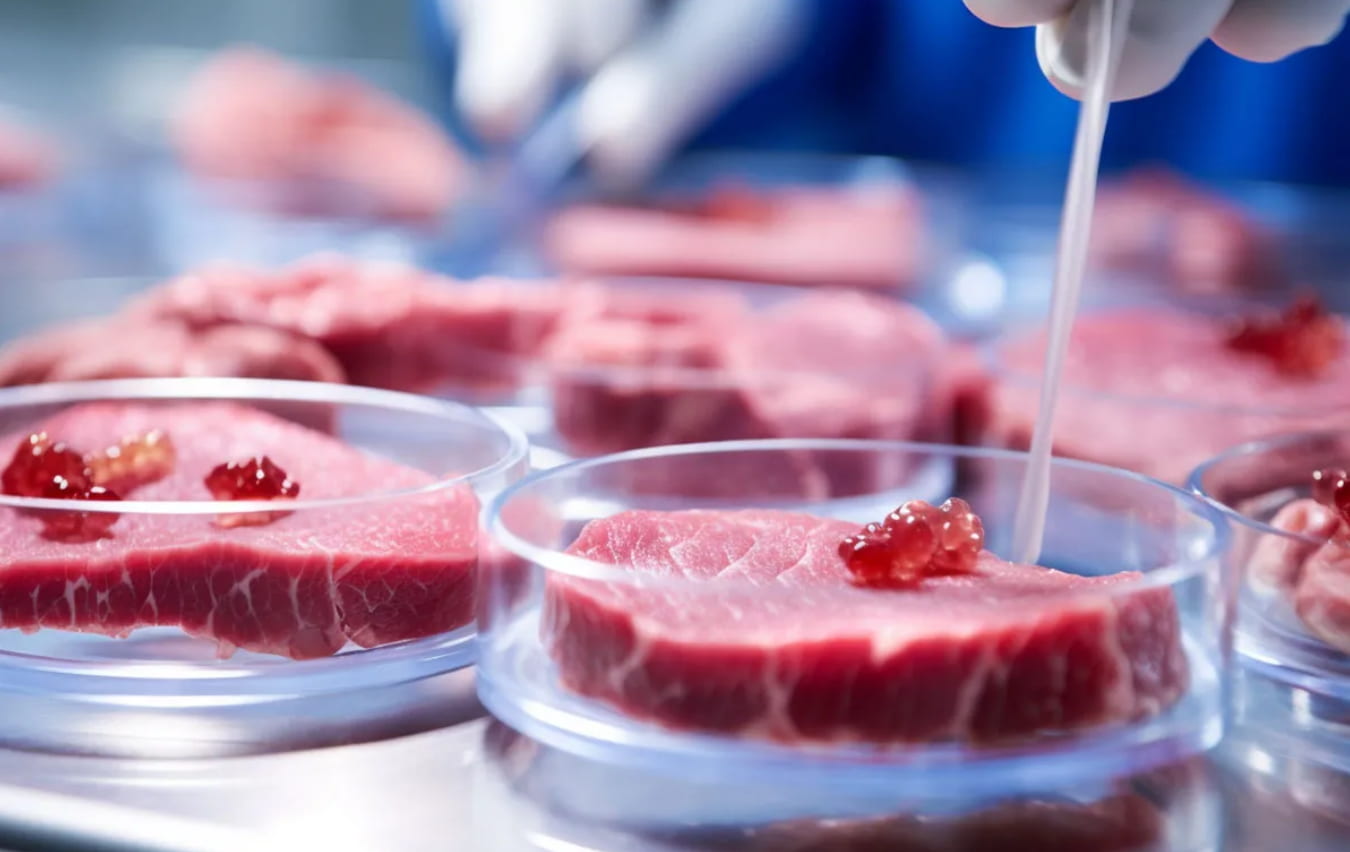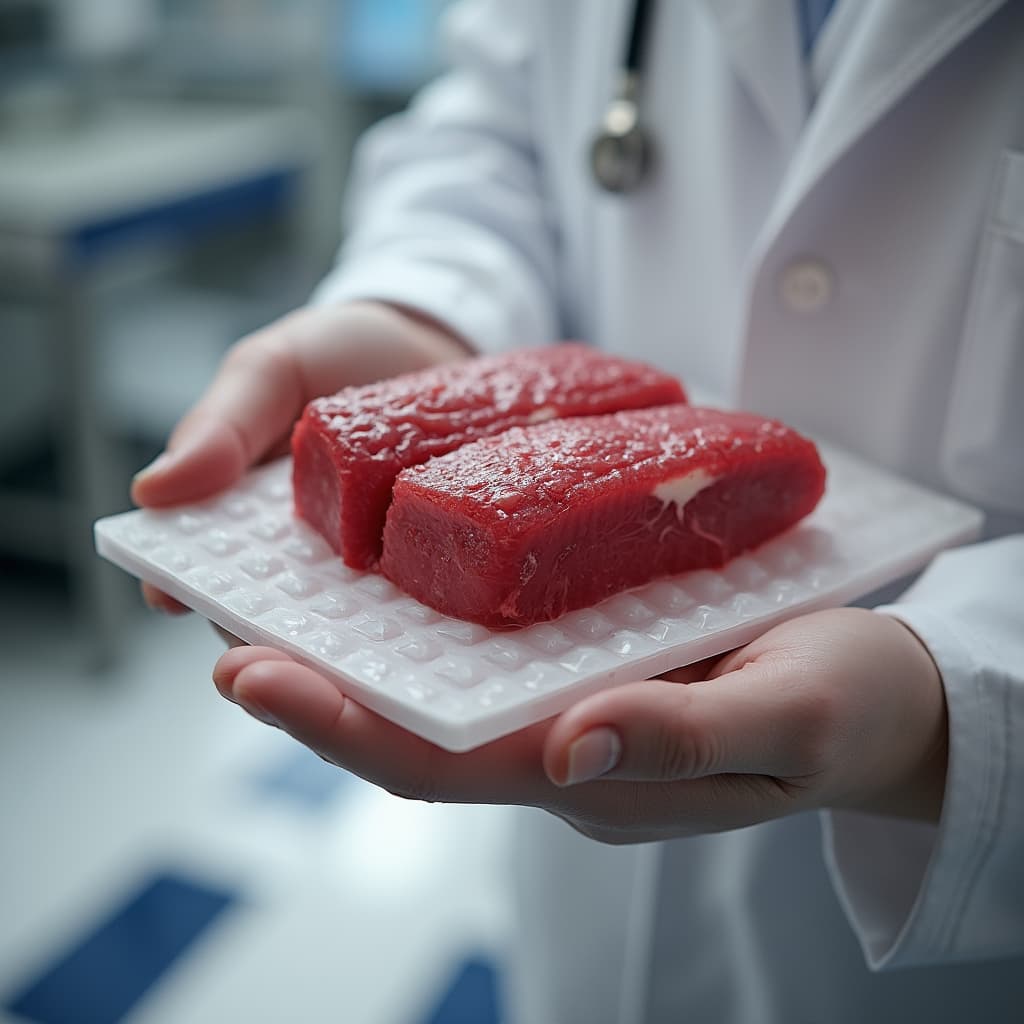Picture this: you’re sinking your teeth into a burger that wasn’t raised on a farm or ever had to moo. Quite fascinating, don’t you think? It’s like something out of a futuristic movie, but this concept of lab-grown meat isn’t just sci-fi anymore—it’s real life.
People are calling it an environmentally conscious, animal-friendly fix to our meat obsession.
But here’s the thing—while it all sounds great on paper, is it really as amazing as it seems? Or is it just another trend destined to fizzle out? Let’s unpack the ups and downs of lab-grown meat to see what’s what.

Why People Are Buzzing About Lab-Grown Meat
Is This the Answer to Our Planet’s Problems?
Let’s address an issue we’re all aware of but often overlook—traditional meat production is kinda rough on the planet. I mean, between the endless fields of crops grown just to feed livestock and excessive water usage they drink, it’s a lot.
Add to that the fact that cows and other animals are pumping out greenhouse gases, and you’ve got yourself a recipe for environmental strain.
But lab-grown meat fundamentally redefines this inefficient system. Supposedly, you could make the same amount of meat we consume today while using about 1% of the land. Imagine that: no more cutting down forests for grazing or feed crops, and way less pollution in the air.
Plus, it takes significantly less water—pretty handy for places that are already struggling with droughts.
Cruelty-Free Meat? Now That’s Something
Alright, let’s not sugarcoat it—factory farming isn’t exactly sunshine and daisies. Animals often live in super cramped, not-so-great conditions, and let’s not even talk about the whole slaughtering process.
Lab-grown meat could change all of that. No animals raised in tight pens, no need to slaughter them, stress-free process. It’s just meat, minus the moral baggage. If you’re someone who gets that gut-punch feeling thinking about animal suffering, this might sound like a dream.
A Cleaner, Healthier Option
Ok, so here’s a neat little bonus. Lab-grown meat is cooked up (not literally, yet) in controlled environments, so you’re way less likely to have bacteria and foodborne illnesses contaminating the product.
And since there are no live animals involved, you can skip the antibiotics they’d normally get, which means you’re not eating any surprise chemical leftovers.
A significant advantage? Scientists could modify the nutritional composition of this meat. Want less fat in your steak? Done. Need more iron in your diet? Easy fix. It’s basically a custom-made meal before it even hits your plate.
Could It Keep Everyone Fed?
With more mouths to feed on this planet every year, finding enough food is a real concern. Right now, traditional farming relies on so many unpredictable factors—weather, disease, the cost of feed—it’s a risky business.
Lab-grown meat doesn’t have these same hang-ups. You could grow it anywhere, anytime, without worrying about droughts or floods messing everything up. It could, in theory, be a steady supply of protein for the whole world.

But It’s Not All Sunshine and Rainbows
The “Wait, What Am I Eating?” Problem
Here’s the thing, though—there’s something about the phrase “lab-grown” that makes people stop and go, “Uhh… really?” It’s this whole unnatural vibe that tends to freak folks out a little.
Similar to the public’s initial reaction to genetically modified foods. It doesn’t matter how safe or sustainable it might be; for a lot of people, it’s just a hard “no.”
And that’s a big hurdle. If people aren’t on board with the concept, it doesn’t really matter how good it is.
Potential Challenges for Traditional Farmers
Ok, here’s a tricky one. What happens to all the people who’ve been raising animals for generations if lab-grown meat takes off? Farming isn’t just a job for many folks—it’s their whole way of life.
And if lab-grown meat grabs a big slice of the market, you’ve got to wonder how those farmers will adapt—or if they even can.
The Taste Factor
So, this is where things get real: how does it actually taste? Well, early attempts at lab-grown meat haven’t been exactly blowing people’s minds. It’s missing that natural juiciness, the fat marbling, the depth of flavor that defines a good steak or burger.
Scientists are working on making it better, but if they don’t nail that flavor, it’s going to be a tough sell for anyone who’s picky about what’s on their plate.
Can Overproduction Pose New Risks?
Here’s something you might not think about: if lab-grown meat becomes cheap and easy to produce, people might start eating way more of it than they should. Think about fast food—affordable, convenient, and super tempting—but it’s not exactly the best thing for your health.
If this happens, we might see an increase in issues like obesity, kind of cancelling out the benefits lab-grown meat was supposed to bring.
| Criteria |
Pros |
Cons |
|---|---|---|
| Environmental Impact | – Requires only 1% of the land used for traditional livestock. – Significant reduction in greenhouse gas emissions. – Saves water resources. |
– Some people view it as “unnatural,” leading to skepticism. |
| Ethics | – No slaughter or mistreatment of animals. – Meets demand for cruelty-free food. |
– Disconnects from traditional farming practices, which may face criticism. |
| Health | – Lower risk of foodborne illnesses due to sterile production. – Antibiotic-free, reducing residues in food. – Can be customized to reduce saturated fat or add nutrients. |
– Overconsumption risk if prices drop too low, potentially contributing to obesity issues. |
| Food Security | – Unaffected by weather, disease, or land shortages. – Ensures year-round production to meet demand. |
– Transitioning to new technologies could disrupt rural communities and livelihoods. |
| Taste and Texture | – Potential for future customization to improve flavor and mouthfeel. | – Not yet identical to traditional meat in taste and texture, which could deter purists. |
| Economic Impact | – Opportunities for innovation and new industries. | – Threatens jobs in traditional farming sectors. |
Ok, So What’s the Verdict?
Look, lab-grown meat sounds pretty amazing in a lot of ways. It’s better for the environment, could solve a bunch of ethical concerns, and might even help with global food supply issues. But it’s not without its hiccups. There’s the whole “what am I even eating?” factor, potential job losses for farmers, and, oh yeah, the taste still needs some work.
At the end of the day, lab-grown meat is still a work in progress. It’s got a lot of potential, sure, but it’s not quite ready to replace the real thing just yet.
If you care about things like sustainability and animal welfare, it’s worth keeping an eye on. But if you’re someone who lives for a perfectly cooked steak, this might not hit the spot for you—at least not for now.
So, what do you think? Does lab-grown meat sound like the future, or does it leave you wanting something more familiar? Let’s talk about it!





